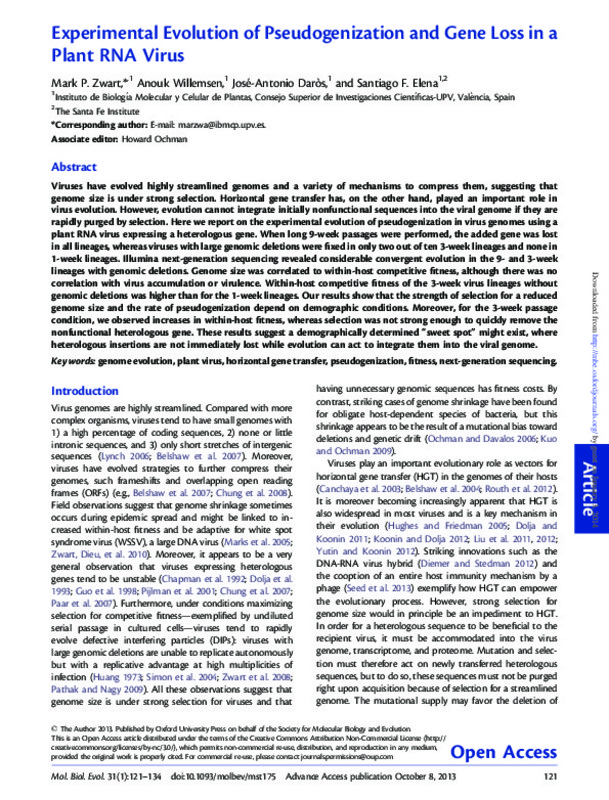JavaScript is disabled for your browser. Some features of this site may not work without it.
Buscar en RiuNet
Listar
Mi cuenta
Estadísticas
Ayuda RiuNet
Admin. UPV
Experimental evolution of pseudogenization and gene loss in a plant RNA virus
Mostrar el registro sencillo del ítem
Ficheros en el ítem
| dc.contributor.author | Zwart, Mark Peter
|
es_ES |
| dc.contributor.author | Willemsen, Anouk
|
es_ES |
| dc.contributor.author | Daros Arnau, Jose Antonio
|
es_ES |
| dc.contributor.author | Elena Fito, Santiago Fco
|
es_ES |
| dc.date.accessioned | 2016-10-24T09:40:30Z | |
| dc.date.available | 2016-10-24T09:40:30Z | |
| dc.date.issued | 2014-01 | |
| dc.identifier.issn | 0737-4038 | |
| dc.identifier.uri | http://hdl.handle.net/10251/72658 | |
| dc.description.abstract | [EN] Viruses have evolved highly streamlined genomes and a variety of mechanisms to compress them, suggesting that genome size is under strong selection. Horizontal gene transfer has, on the other hand, played an important role in virus evolution. However, evolution cannot integrate initially nonfunctional sequences into the viral genome if they are rapidly purged by selection. Here we report on the experimental evolution of pseudogenization in virus genomes using a plant RNA virus expressing a heterologous gene. When long 9-week passages were performed, the added gene was lost in all lineages, whereas viruses with large genomic deletions were fixed in only two out of ten 3-week lineages and none in 1-week lineages. Illumina next-generation sequencing revealed considerable convergent evolution in the 9- and 3-week lineages with genomic deletions. Genome size was correlated to within-host competitive fitness, although there was no correlation with virus accumulation or virulence. Within-host competitive fitness of the 3-week virus lineages without genomic deletions was higher than for the 1-week lineages. Our results show that the strength of selection for a reduced genome size and the rate of pseudogenization depend on demographic conditions. Moreover, for the 3-week passage condition, we observed increases in within-host fitness, whereas selection was not strong enough to quickly remove the nonfunctional heterologous gene. These results suggest a demographically determined "sweet spot" might exist, where heterologous insertions are not immediately lost while evolution can act to integrate them into the viral genome. | es_ES |
| dc.description.sponsorship | The authors thank Alejandro Manzano Marin for his bioinformatics guidance with the Illumina analysis and Francisca de la Iglesia, Paula Agudo, and Angels Prosper for technical support. This project was made possible through the support of grant 22371 from the John Templeton Foundation to S. F. E. The opinions expressed in this publication are those of the authors and do not necessarily reflect the views of John Templeton Foundation. Additional support was received from the Spanish Direccion General de Investigacion Cientifica y Tecnica grants BFU2012-30805 to S. F. E, JCI2011-10379 to M.P.Z, and BIO2011-26741 to J.A.D., and by a Rubicon grant from the Netherlands Organization for Scientific Research (www.nwo.nl) to M.P.Z. | |
| dc.language | Inglés | es_ES |
| dc.publisher | Oxford University Press (OUP): Molecular Biology and Evolution | es_ES |
| dc.relation.ispartof | Molecular Biology and Evolution | es_ES |
| dc.rights | Reconocimiento - No comercial (by-nc) | es_ES |
| dc.subject | Genome evolution | es_ES |
| dc.subject | Plant virus | es_ES |
| dc.subject | Horizontal gene transfer | es_ES |
| dc.subject | Pseudogenization | es_ES |
| dc.subject | Fitness | es_ES |
| dc.subject | Next-generation sequencing | es_ES |
| dc.title | Experimental evolution of pseudogenization and gene loss in a plant RNA virus | es_ES |
| dc.type | Artículo | es_ES |
| dc.identifier.doi | 10.1093/molbev/mst175 | |
| dc.relation.projectID | info:eu-repo/grantAgreement/JTF//22371/ | es_ES |
| dc.relation.projectID | info:eu-repo/grantAgreement/MINECO//BFU2012-30805/ES/EVOLUTIONARY SYSTEMS VIROLOGY: EPISTASIS AND THE RUGGEDNESS OF ADAPTIVE LANDSCAPES, MUTATIONS IN REGULATORY SEQUENCES, AND THE HOST DETERMINANTS OF VIRAL FITNESS/ | es_ES |
| dc.relation.projectID | info:eu-repo/grantAgreement/MICINN//JCI-2011-10379/ES/JCI-2011-10379/ | es_ES |
| dc.relation.projectID | info:eu-repo/grantAgreement/MICINN//BIO2011-26741/ES/PATOGENOS DE RNA DE PLANTAS: INTERACCION CON EL HUESPED Y DESARROLLO DE HERRAMIENTAS BIOTECNOLOGICAS/ | |
| dc.rights.accessRights | Abierto | es_ES |
| dc.contributor.affiliation | Universitat Politècnica de València. Instituto Universitario Mixto de Biología Molecular y Celular de Plantas - Institut Universitari Mixt de Biologia Molecular i Cel·lular de Plantes | es_ES |
| dc.description.bibliographicCitation | Zwart, MP.; Willemsen, A.; Daros Arnau, JA.; Elena Fito, SF. (2014). Experimental evolution of pseudogenization and gene loss in a plant RNA virus. Molecular Biology and Evolution. 31(1):121-134. https://doi.org/10.1093/molbev/mst175 | es_ES |
| dc.description.accrualMethod | S | es_ES |
| dc.relation.publisherversion | https://dx.doi.org/10.1093/molbev/mst175 | es_ES |
| dc.description.upvformatpinicio | 121 | es_ES |
| dc.description.upvformatpfin | 134 | es_ES |
| dc.type.version | info:eu-repo/semantics/publishedVersion | es_ES |
| dc.description.volume | 31 | es_ES |
| dc.description.issue | 1 | es_ES |
| dc.relation.senia | 266225 | es_ES |
| dc.identifier.eissn | 1537-1719 | |
| dc.identifier.pmid | 24109604 | en_EN |
| dc.identifier.pmcid | PMC3879446 | en_EN |
| dc.contributor.funder | Ministerio de Ciencia e Innovación | |
| dc.contributor.funder | John Templeton Foundation | |
| dc.contributor.funder | Ministerio de Economía y Competitividad |








